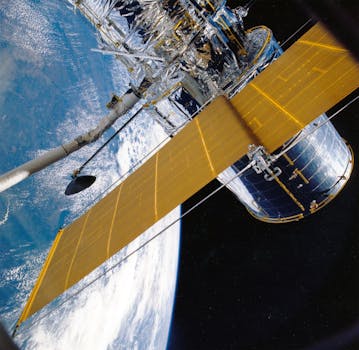
The Future of Satellites: Revolutionizing Global Communication and Exploration
The future of satellites holds immense promise, with advancements in technology and innovation poised to revolutionize global communication and space exploration. Satellites have been a crucial part of our daily lives, providing us with navigation, communication, and weather forecasting, among other services. As we move forward, the role of satellites is expected to expand, with new technologies and applications emerging to transform the way we live and work.
Advances in Satellite Technology
One of the key drivers of the future of satellites is the rapid advancement in technology. Satellites are becoming smaller, lighter, and more powerful, with improved propulsion systems and enhanced communication capabilities. The development of new materials and manufacturing techniques has enabled the creation of smaller and more efficient satellites, making them more accessible and affordable for a wide range of applications. For instance, the use of 3D printing has allowed for the creation of complex satellite components, such as antennas and propulsion systems, with increased precision and reduced production time.
Another significant advancement in satellite technology is the emergence of satellite constellations. These constellations consist of multiple satellites working together to provide global coverage and continuous connectivity. Satellite constellations have the potential to revolutionize the way we communicate, providing high-speed internet access to remote and underserved communities around the world. Companies such as SpaceX and OneWeb are already working on deploying satellite constellations, with the goal of providing global internet coverage and bridging the digital divide.
Applications of Satellites in the Future
The future of satellites holds a wide range of applications, from communication and navigation to Earth observation and space exploration. Satellites will play a critical role in the development of the Internet of Things (IoT), enabling the connection of billions of devices and sensors around the world. They will also provide critical infrastructure for the development of smart cities, enabling the efficient management of resources and services.
Satellites will also continue to play a vital role in space exploration, providing critical communication and navigation services for deep space missions. The use of satellites will enable the creation of permanent human settlements on the Moon and Mars, with satellites providing the necessary communication and navigation infrastructure. Furthermore, satellites will be used to study the Earth’s climate and environment, providing critical data and insights for climate modeling and prediction.
Challenges and Opportunities
While the future of satellites holds immense promise, there are also challenges and opportunities that need to be addressed. One of the key challenges facing the satellite industry is the issue of space debris, with thousands of defunct satellites and other objects orbiting the Earth and posing a risk to operational satellites. The development of new technologies and strategies for mitigating space debris is critical to ensuring the long-term sustainability of space exploration and development.
Another challenge facing the satellite industry is the issue of regulatory frameworks and international cooperation. The use of satellites is a global phenomenon, and the development of common standards and regulations is critical to ensuring the safe and efficient use of satellites. International cooperation and agreements will be necessary to address issues such as frequency allocation, satellite registration, and liability for damage caused by satellites.
Conclusion
In conclusion, the future of satellites is poised to revolutionize global communication and space exploration. With advancements in technology and innovation, satellites will play an increasingly critical role in our daily lives, providing us with navigation, communication, and weather forecasting, among other services. As we move forward, it is critical that we address the challenges and opportunities facing the satellite industry, from space debris and regulatory frameworks to international cooperation and agreement. By working together, we can ensure that the future of satellites is bright and that the benefits of satellite technology are available to all.




